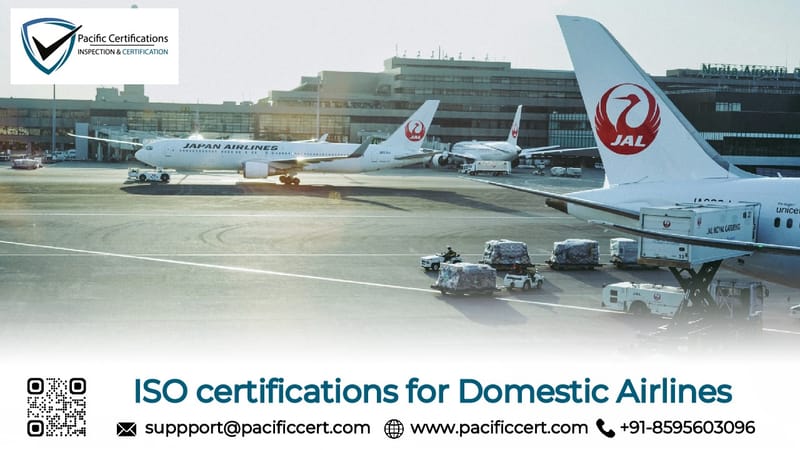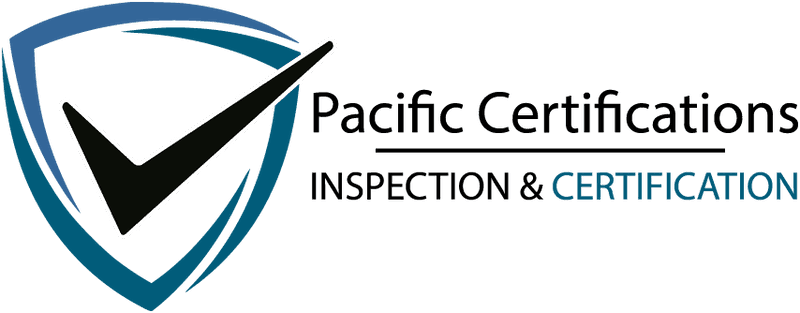ISO Certifications for Domestic Airlines, Requirements and Benefits

Introduction
Domestic airlines play a vital role in connecting cities, supporting economic activity, and enabling mobility within a country. Every day, domestic carriers manage complex operations that include flight scheduling, aircraft turnaround, crew management, maintenance coordination, passenger handling, baggage services, ticketing systems, and regulatory compliance. These operations must function seamlessly across multiple airports, often under tight time constraints and cost pressures.
With domestic air travel continuing to grow in many regions, airlines face increasing expectations around safety, punctuality, service quality, environmental responsibility, and data security. Even minor disruptions—such as maintenance delays, crew shortages, IT outages, or baggage mishandling—can quickly cascade into widespread delays and customer dissatisfaction. At the same time, regulators and aviation authorities are intensifying oversight, while passengers are becoming more vocal about service reliability and transparency.
As domestic passenger traffic is expected to continue steady growth over the next decade, airlines must rely on structured systems rather than ad-hoc controls. ISO certifications provide domestic airlines with internationally recognized frameworks to standardize operations, manage risks, and demonstrate reliability to regulators, partners, and passengers.
In domestic aviation, every on-time departure reflects disciplined systems working quietly behind the scenes.
Quick Summary
ISO certifications help domestic airlines improve operational consistency, enhance safety, reduce environmental impact, secure digital systems, and maintain service continuity. The most relevant standards include ISO 9001, ISO 14001, ISO 45001, ISO 22301, ISO/IEC 27001, and ISO 50001. Certification reassures aviation authorities, airport partners, and passengers that airline operations are professionally managed, compliant, and resilient.
For more information on how we can assist your domestic airline operations with ISO certifications, please contact us at [email protected].
Applicable ISO Standards for Domestic Airlines
Domestic airline operations span service delivery, safety, engineering, IT systems, and regulatory compliance. Multiple ISO standards apply because airline activities involve quality management, occupational safety, environmental performance, information security, and continuity planning. Below are the key applicable ISO standards for domestic airlines:
ISO 9001: Quality Management Systems
ISO 9001 provides a structured framework for managing airline processes such as flight operations planning, check-in and boarding, baggage handling coordination, customer service, and irregular operations management. For domestic airlines, it helps standardize service delivery across routes, airports, and shifts, reducing variability and errors.
ISO 45001: Occupational Health and Safety Management Systems
Domestic airline operations involve flight crews, cabin crew, engineers, dispatchers, and ground staff working in high-risk environments. ISO 45001 helps airlines systematically identify safety hazards, manage fatigue risks, prevent workplace injuries, and protect employees involved in operations and maintenance.
ISO 14001: Environmental Management System (EMS)
Airlines face growing pressure to manage fuel emissions, ground noise, waste from catering, and environmental compliance at airports. ISO 14001 provides a framework to control environmental impacts, meet regulatory requirements, and support sustainability commitments increasingly expected by authorities and the public.
ISO 27001: Information Security Management Systems (ISMS)
Domestic airlines rely heavily on digital systems for reservations, crew scheduling, maintenance tracking, and passenger data. ISO/IEC 27001 helps airlines protect these systems against cyber threats, data breaches, and system misuse, ensuring confidentiality, integrity, and availability of critical information.
ISO 22301:2019 – Business Continuity Management Systems
Disruptions such as IT failures, crew shortages, weather events, or airport shutdowns can severely affect domestic airline schedules. ISO 22301 ensures airlines are prepared to respond to incidents and restore critical operations quickly, minimizing passenger disruption and financial impact.
ISO 50001: Energy Management Systems
Fuel and energy costs represent a major portion of airline operating expenses. ISO 50001 supports systematic monitoring of fuel consumption, ground energy use, and efficiency initiatives, helping domestic airlines control costs and reduce environmental impact.
Click here to find out more applicable standards to your industry
What are the requirements of ISO Certifications for Domestic Airlines?
Understanding ISO requirements helps airlines implement systems that support real operations rather than paperwork. Below is an overview of the general and standard-specific requirements applicable to domestic airlines.
General requirements:
Covering flight operations, ground handling, maintenance coordination, and passenger services
Written commitments on safety, service quality, environmental responsibility, and data protection
Identifying risks such as flight delays, safety incidents, IT failures, and regulatory non-compliance
Standardizing processes for check-in, boarding, turnaround, maintenance release, and incident handling
Ensuring staff competence through training on safety, customer service, and operational procedures
Tracking KPIs such as on-time performance, baggage handling errors, incidents, and complaints
Maintaining records of operations, inspections, incidents, and audits
Conducting periodic internal audits and management reviews
Standard requirements: ISO 9001: Quality Management Systems
Quality Policy and Objectives: The airline must establish a quality policy and set measurable quality objectives aligned with customer and regulatory requirements.
Documented Information: Proper documentation of processes, procedures, and records is necessary to demonstrate compliance with the standard.
Process Approach: The airline must adopt a process approach, ensuring that all processes are efficient and contribute to the overall quality management system.
Leadership and Commitment: Top management must demonstrate leadership and commitment to the QMS, ensuring that it is integrated into the organization’s overall strategy.
Customer Focus: The airline must ensure that customer needs and expectations are understood and met, leading to enhanced customer satisfaction.
ISO 45001: Occupational Health and Safety Management Systems
Hazard Identification and Risk Assessment: The airline must identify hazards and assess the risks associated with its operations, taking steps to mitigate these risks.
Legal Compliance: The airline must comply with relevant health and safety legislation and regulations.
OHS Policy: The airline must establish and implement an occupational health and safety policy, ensuring the health and safety of all employees and stakeholders.
Emergency Preparedness and Response: The airline must have procedures in place to respond to emergencies, ensuring the safety of employees and passengers.
ISO 14001: Environmental Management Systems
Environmental Policy: The airline must establish an environmental policy that includes commitments to environmental protection, compliance with legal requirements, and continuous improvement.
Environmental Aspects and Impacts: The airline must identify the environmental aspects of its operations and evaluate their impacts, taking steps to manage and reduce these impacts.
Compliance Obligations: The airline must comply with all applicable environmental laws and regulations.
Operational Control: The airline must implement operational controls to manage significant environmental aspects and ensure compliance with its environmental policy.
ISO 27001: Information Security Management Systems
Risk Assessment: The airline must conduct a risk assessment to identify and evaluate information security risks, taking steps to mitigate these risks.
Information Security Policy: The airline must establish and implement an information security policy, ensuring the protection of sensitive information.
Access Control: The airline must implement access controls to protect sensitive information from unauthorized access.
Incident Management: The airline must have procedures in place to respond to information security incidents, ensuring that they are managed effectively.
ISO 22301: Business Continuity Management Systems
Business Impact Analysis: The airline must conduct a business impact analysis to identify critical business functions and assess the impact of disruptions.
Business Continuity Plans: The airline must develop and implement business continuity plans to ensure the continued operation of critical functions during a disruption.
Training and Awareness: The airline must ensure that employees are trained and aware of their roles and responsibilities in the event of a disruption.
Exercise and Testing: The airline must regularly test its business continuity plans to ensure their effectiveness.
ISO 50001: Energy Management Systems
Energy Policy: The airline must establish an energy policy that includes commitments to energy efficiency, compliance with legal requirements, and continuous improvement.
Energy Review: The airline must conduct an energy review to identify significant energy uses and opportunities for improvement.
Energy Performance Indicators: The airline must establish energy performance indicators to measure and monitor energy performance.
Energy Objectives and Targets: The airline must set energy objectives and targets, aligned with its energy policy and legal requirements.
Tip:Domestic airlines often begin with ISO 9001 to stabilize service quality, followed by ISO 45001 to strengthen workforce safety. With increasing reliance on digital systems, ISO/IEC 27001 is becoming a critical next step.
Ensure your Domestic Airline meets global standards with ISO certification. Contact us at [email protected] or call +91-8595603096 for more information.
What are the benefits of ISO Certifications for Domestic Airlines?
Below are the key benefits of implementing ISO standards into domestic airline operations:
More consistent passenger experience, as standardized processes reduce delays, service inconsistencies, and avoidable disruptions across routes and airports.
Improved safety culture and workforce protection, helping airlines reduce incidents involving crew, ground staff, and maintenance teams while supporting regulatory compliance.
Stronger operational resilience, enabling airlines to manage disruptions such as weather events, system failures, or crew shortages with less impact on passengers.
Better control over environmental and fuel performance, supporting emissions reduction, cost savings, and alignment with national sustainability goals.
Enhanced protection of passenger and operational data, reducing exposure to cyber threats and data breaches in reservation and operations systems.
Greater confidence from regulators and partners, as ISO certification demonstrates disciplined governance and internationally aligned operational control.
Domestic aviation is in a period of measurable recovery and structural change. According to the International Air Transport Association (IATA), global domestic passenger traffic recovered to nearly 95% of pre-pandemic levels in 2025, with faster rebounds in markets such as India, China, and Latin America. IATA forecasts that by 2030 domestic traffic will exceed 7.1 billion passengers annually, driven by rising middle-class demand, urbanization, and intra-regional travel liberalization.
Cost pressures continue to influence airline strategies. Jet fuel — historically one of the largest operating expenses — accounted for approximately 23% of airline costs in 2024, even as carriers implement fuel-efficiency programs and route optimization technologies. At the same time, fleet modernization and sustainable aviation fuel (SAF) adoption are reshaping cost structures, with global SAF production capacity projected to grow five-fold by 2030, according to industry analysts.
Safety and performance expectations are tightening. Aviation regulators in multiple regions, including the European Union Aviation Safety Agency (EASA) and the U.S. Federal Aviation Administration (FAA), reported a rise in audit actions related to operational risk management and data security, prompting airlines to strengthen governance frameworks.
Digital transformation is also accelerating. Surveys of airline CIOs show that over 80% of domestic carriers have increased investments in cybersecurity and operational IT systems, in response to a nearly 30% rise in cyber attempts targeting aviation critical systems over the same period.
Sustainability is an increasing differentiator in competitive markets. Domestic carriers are setting emissions reduction targets with several aiming for net-zero carbon operations by 2050, and are under growing pressure from regulators and passengers to reduce noise and local air quality impacts. Structured systems such as ISO 14001 and ISO 50001 help airlines integrate environmental and energy performance into core operations, a requirement that industry reports indicate can lead to 10–15% reductions in fuel and energy consumption over three years.
How Pacific Certifications Can Help
Pacific Certifications, accredited by ABIS, acts as an independent certification body for domestic airline operators. We conduct impartial audits to assess whether airline management systems and operational practices conform to applicable ISO standards, based strictly on documented evidence and real operational controls.
We support domestic airlines through:
Independent certification audits conducted in accordance with ISO/IEC 17021
Objective assessment of airline operations, safety systems, and controls
Clear audit reporting and certification decisions
Issuance of internationally recognized ISO certificates
Surveillance and recertification audits to maintain certification validity
If you need support with ISO certification for your domestic airline operations, contact [email protected]or +91-8595603096.
Author: Seema
Read More at: Blogs by Pacific Certifications

